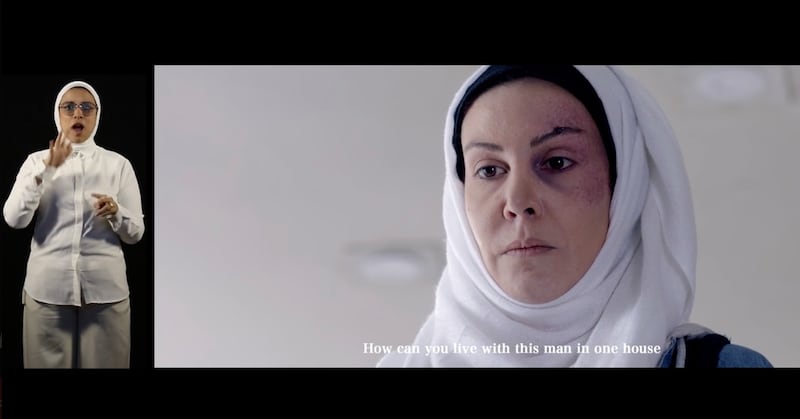For the hearing-impaired in Egypt, enjoying a film or TV series can be frustrating without the support of a translator, with captions and subtitles often failing to capture the full experience.
A streaming platform tailored for the deaf community is beginning to change that, but faces a challenge over lack of funding.
Cinema Deaf, which launched in February 2023, offers free access to award-winning short films from the Arab world that are translated into sign language. The initiative, the first in Egypt, was founded by film programmer and producer Waguih El Laqany in a bid to increase inclusion and accessibility.
The self-funded platform is designed by a team of deaf people along with interpreters and filmmakers. It was the brainchild of El Laqany, founder and director of Cinema Everywhere.
That project was established in 2013 under non-profit umbrella group Art Everywhere and aims to promote cinematic culture and build an audience for alternative Arab, European and American films among Egypt’s young people.
“From the start, the deaf community was one of the audiences that Cinema Everywhere wanted to target,” he told The National.
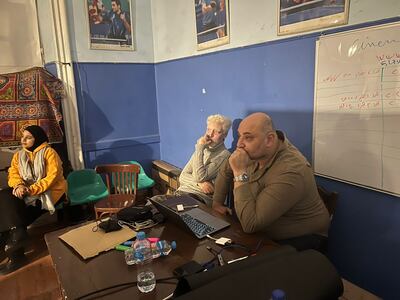
In 2013, Art Everywhere screened its first silent film, Away from the Heat, directed by Mina Nabil, at the Deaf Fraterna Connection Association, one of the oldest deaf associations in Alexandria. It was well received.
However, it was in 2020 that the idea of an online streaming platform for the deaf community was conceived after Cinema Everywhere organised the American Film Forum in collaboration with the US Embassy in Cairo to show American-produced alternative movies translated into sign language.
“After the event, I was approached by a group of youths who asked if I could upload the films to YouTube so that others can watch them. I told them I did not have the copyrights to do so,” El Laqany explained.
“This is how the idea of Cinema Deaf came to be and was implemented in February 2023.”
Since its launch, the platform has reached 128,000 viewers from Egypt and other Arab countries.
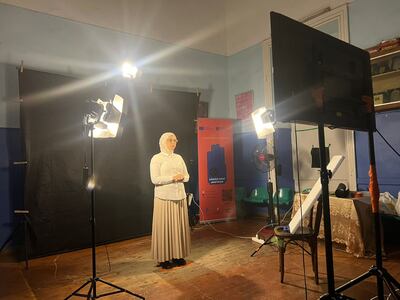
Breaking the barrier
It has been reported that Egypt’s 4.2 million hearing-impaired people struggle with inclusivity and the support required to integrate them into society.
“Sign language is not used as a means of communication across Egyptian organisations and committees or by the media,” explained Nadia Abdallah, an interpreter and sign language coach at the Egyptian Association for Deaf Rights. “This completely isolates the deaf and hard-hearing community.”
That’s why El Laqany carefully selected Cinema Deaf’s team of three deaf members and three CODA interpreters fully fluent in sign language from childhood to draft the script and review the final translation.
The team selects the movies based on a set of criteria, mainly recommendations by programmers and the deaf community,” added El Laqany. “The films must have ratings by critics. They must be of interest to filmmakers, and have won awards in international and Arab festivals. The team then makes the final selection.”
The platform, currently preparing for its third season, is expected to screen 25 short Arab films.
Before the films are ready to be screened, the team works on drafting the script, then translating and filming it, said Shorouk Mohammed, Cinema Deaf sign language translator. “The team’s three deaf members will then review the final translation,” Mohammed, a CODA, said.
Abdallah explained that one of the basic rules of sign language interpretation is that the upper third of the body needs to be visible during translation, “a rule that was not followed on most platforms”. So action was taken.
“We adjusted what is shown so the translator takes up 30 per cent of the screen, in accordance with the guidance of broadcasting sign language interpreters,” El Laqany explained.
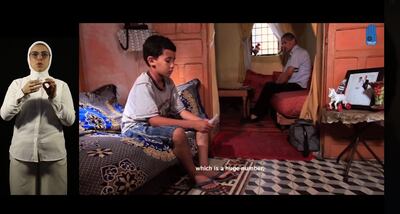
Finally enjoying a film
Shorouk’s mother, Ola, 51, is a Cinema Deaf regular who has found the streaming platform liberating. “All my life I have watched any movie or series through my daughter,” she told The National, as Shorouk translated.
“I have to ask her ‘what did the actor say?' And 'what did his co-star reply?’ Sometimes I would just watch what was happening on the screen, but I of course did not understand most of the plot,” she said.
Cinema Deaf allowed Ola to watch films to her heart’s desire and enjoy the magic of storytelling without having to construct an imagined dialogue in her mind or need assistance from her daughter. “I simply go on the platform, select a movie and watch,” she explained.
Another fan of the platform is Abssam Ashraf, 19, a student in Cairo’s Faculty of Specific Education. Hard of hearing, he does not hesitate to share the link with his deaf and hearing-impaired friends after he watching a film.
“I send to people I know in Alexandria and other areas in Egypt, as well as community members abroad,” he told The National. “They were thrilled by the experience and are hoping for a wider selection of films to be streamed on the platform.”
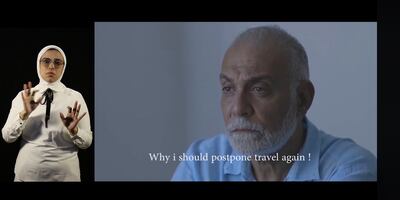
Funding difficulties
At the start, the initiative was supported by the European Union National Institutes for Culture (EUNIC), but now only receives funding from Cinema Everywhere and Art Everywhere, which are both owned by El Laqany.
“EUNIC holds an annual theme-based competition to support innovative ideas,” El Laqany said. “Cinema Deaf competed and won, and we received funding for the first season. We screened 10 short Arab films for six months. You can only compete once.”
Cinema Deaf has acquired copyright from film distributors and owners for a limited period, either for free or for a symbolic sum. However, lack of funding limits its plans to buy more copyrights, expand the team and diversify its film collection, according to El Laqany.
El Laqany said: “We hope to have continued support to help us build a permanent and rich collection of films that caters to different tastes.”
This article was produced in collaboration with Egab.
